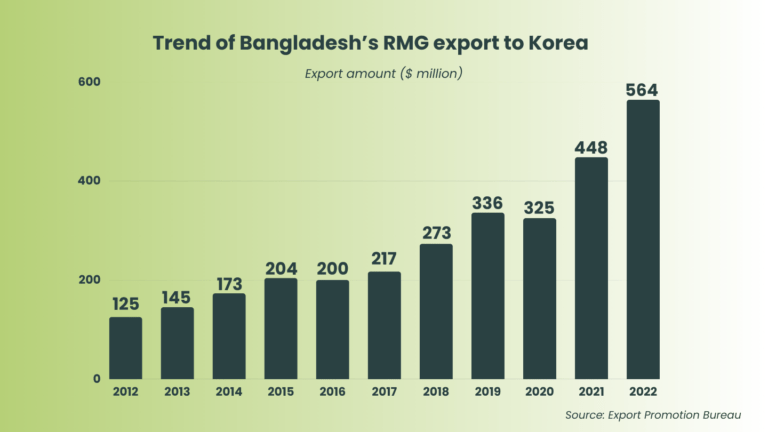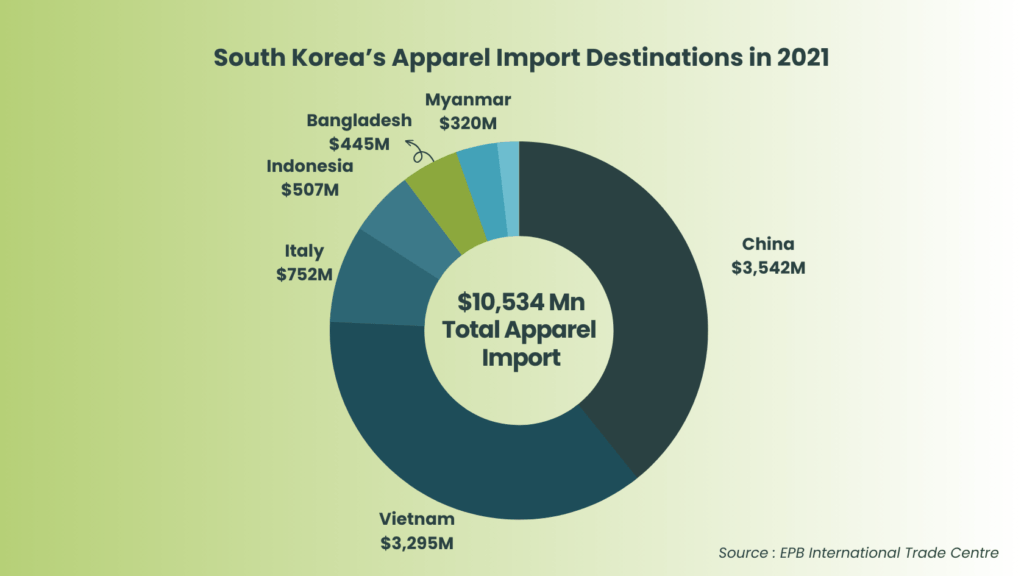In 2022, the bilateral trade volume between Korea and Bangladesh reached $3.03 billion, marking a 38.71% increase from the previous year’s $2.19 billion. This substantial growth solidifies Korea’s position as the fifth-largest investor in Bangladesh, signifying a long-term milestone in their economic relationship. Notably, Korea’s influence extends beyond investment; it has evolved into a critical trading partner for Bangladesh, encompassing exports, imports, and infrastructure development.
Over the span of 8 years, merchandise exports to Korea have also experienced an impressive growth rate of 122.71%, surging from $280.09 to $623.79 million. Interestingly, despite the strong demand of our RMG products, the overall trade dynamics between Korea and Bangladesh had remained relatively stagnant for almost a decade following its peak at $1.87 billion in 2011. This period was marked by an atypical decline, reaching a low of $1.42 billion in 2020. However, a shift began to unfold after 2021 as trade volumes surpassed the $2 billion mark. Moreover, Korea has recently opted to substantially raise its favorable soft loan offer to Bangladesh, elevating it from 700 million dollars to 3 billion dollars over a span of five years.
Areas of Investments
Ready-Made Garments (RMG): Korean companies have been with Bangladesh in its journey to become the second-largest RMG exporter in the world. Youngone Corporation, the first and largest RMG foreign investor in Bangladesh, established the Korean EPZ or KEPZ in Chattogram, the first private EPZ in Bangladesh. Among the 200 Korean investment companies in Bangladesh, over 70 percent are in the RMG and textile sector employing over 150,000 Bangladesh workers.
Infrastructure: In infrastructure development, around 110 Korean companies have participated in about 200 projects in Bangladesh since the establishment of diplomatic ties. Total project value exceeds 8 billion US dollars. In this development cooperation, Bangladesh is one of the priority partner countries of Korea and the third largest recipient of Korea’s ODA, official development assistance. The Meghna Bridge Project on the Bhulta-Araihazar-Bancharampur Road (R-203) and Supplying of Treated Water from Meghna River to Bangabandhu Sheikh Mujib Shilpa Nagar (BSMSN), are being discussed for assistantship through the mechanism of Joint PPP Platform Meeting.
ICT and Electronics: In ICT and automobiles, in partnership with Bangladeshi companies, Major Korean companies like Samsung and Hyundai have been assembling its product locally. Samsung Electronics has been operating its R&D Institute in Dhaka for almost one decade. To improve the traffic system, They are also installing an intelligent transport system [ITS] in Bangladesh, which is very common and widely used in Korea. It can automatically monitor the highway situation using ICT technology. It will be used on the Mawa expressway.
Labour Forces: Bangladesh is providing attractive conditions for investment by Korean companies, particularly in terms of competitive labor forces, thriving domestic economy and large market. Before the corona pandemic, Korea used to take an average of 1,500 Bangladesh expatriate workers annually through the EPS scheme. In 2022, as many as around 6,000 Bangladesh EPS workers went to Korea. This year they plan to take around 10,000 migrant workers from Bangladesh through the EPS. It is likely that the number can be further increased in the coming years if the current trend continues.
Korea’s Integral Role in Bangladesh’s RMG Sector Growth
The biggest achievement in our bilateral relationship is in the Ready-Made Garments (RMG) sector. Nearly 80 percent of Korea’s investment in Bangladesh is attributed to this sector. Among the 200 Korean investment companies in Bangladesh, over 70 percent are in the RMG and textile sector employing over 150,000 Bangladesh workers. Bangladesh’s RMG export to Korea which was $125 million in 2012 jumped to $564 million in 2022, more than 400% increase in ten years. In 2021 Bangladesh’s RMG export to Korea recorded $448 million with a 38% year-to-year increase and $564 million in 2022 with 25. 8% year-to-year increase.

Global Challengers: Competing Korean Investment Destinations in the RMG Sector against Bangladesh
Despite the consistent growth in Bangladesh’s apparel exports to Korea, its share remains modest at 4.2% of Korea’s total apparel imports. In contrast, China holds a significant 33.6% share, followed by Vietnam at 31.2% .
Vietnam: South Korean financiers invested $2.34 billion in Vietnam between January and July this year, making the country rank second out of 94 countries and territories investing in Vietnam since the year began. South Korean companies harbor high opinions about Vietnam’s business climate, especially its green growth strategy.Although we were able to reclaim the second position in 2021, Bangladesh still lags behind Vietnam in key variables of efficiency, such as lead time, product quality and sustainability.
China: China being the topmost apparel exporting country becomes a potential competitor of Bangladesh. China’s shift towards utilizing non-cotton fibers not only lowers raw material expenses but also attracts greater investment interest from Korea. Bangladesh faces a considerable challenge in the non-cotton garment sector, where China maintains a dominant 70% market share compared to Bangladesh’s modest 5%. Achieving the status of the largest RMG exporter necessitates substantial investment in the non-cotton sub-sector, especially through increased foreign direct investment.
China and Vietnam have already established carbon markets. So there’s a need for Bangladesh to establish a domestic carbon market and formulate carbon reduction policies to remain competitive in global business.

Fostering Ideal Business Climate for Korean Investments and Trade: Recommendations for Bangladesh
Despite being a major investment destination, There are a lot of challenges for Bangladesh that is needed to be addressed to attract more korean investments
- A recurring challenge faced by Korean companies is the intricate and unpredictable customs and tax processes in Bangladesh. The complexity not only elevates business costs but also undermines the investment environment, emphasizing the need for a streamlined and business-friendly customs service for improved trade and interactions between the two countries.
- The process of extending visas for long-term Korean residents in Bangladesh poses challenges, requiring annual renewals that can take months for government approval. To improve this, streamlining visa extension procedures and reducing processing times would be a valuable recommendation for enhancing the ease of doing business and supporting long-term residents.
- Bangladesh should make full use of duty-free and quota-free access to the Korean market. In this regard, the Bangladesh government can actively encourage its companies to make the full use of cash incentives for exporting to the Korean market. As Korea is regarded as the non-traditional market, companies exporting to Korea can get 4% of cash incentives.
- Bangladesh needs to make rigorous efforts to increase exports to Korea by sending business delegations to Korea and participating in various exhibitions in Korea.
- Currently, there is no direct maritime link or air link between Bangladesh and Korea. The establishment of direct cargo lines, both maritime and air cargo, will contribute to the increase of trade between the two countries.




